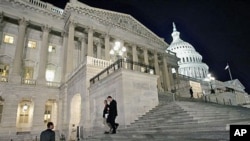In Washington, Democrats and Republicans appear no closer to bridging sharp disagreements on reducing America’s trillion-dollar federal deficit and slowing the nation’s ballooning national debt. For now, legislators of both parties are holding firm to partisan budget proposals for current-year federal spending, which ends in September.
Last week, Congress averted a government shutdown by enacting a stop-gap spending measure that funds federal agencies for a two-week period. The rationale was to give legislators and the Obama administration a brief window to negotiate a budget deal for the remainder of the fiscal year.
But with the clock ticking towards another potential funding expiration, signs of compromise and progress remain elusive. Republicans in the House of Representatives have already passed a funding bill that would slash current spending levels by more than $60 billion. The bill is expected to die in the Senate, where Democrats hold a majority.
"I do not believe what we have from the House is a serious economic plan," he said. "I think it is a very dangerous plan. It cuts teachers, it cuts education, it cuts research, it cuts energy research - all the things we need to do to make America number one again and to move into the global marketplace, their [Republican] budget sets us back."
Democrats have proposed more modest budget cuts, leaving the two parties tens of billions dollars apart in proposed funding levels. The Senate’s top Republican, Mitch McConnell of Kentucky also appeared on Face the Nation. "What is reckless is the $1.6-trillion deficit we are running this year," he said. "What is reckless is the $3 trillion we have added to our national debt. Our national debt is not the size of our economy. We begin to look a lot like Greece [in danger of defaulting on debt]."
Republicans say deep and painful spending cuts are needed to put America’s fiscal house in order so that the private sector can flourish without the burden of a bloated government sector.
Democrats say drastically slashing spending will throw Americans out of work, imperil a fledgling economic recovery, and rob the nation of a better-educated workforce and the technological innovation that will drive economic growth in the future.
The debate illuminates the classic divide in American politics between conservatives, who see the government as a burden to the free market, and liberals, who see the government as a necessary promoter of progress and the common good.
Despite partisan differences, the Obama administration insists compromise is possible. White House Chief of Staff William Daley spoke on NBC’s Meet the Press program.
"We are not that far apart," said Daley. "We [Democrats] are at over $50 billion in cuts. The House passed [a bill] that is $100 billion. So we are over half way there [to a deal]."
Republicans say the White House’s budgetary math is misleading, noting the administration's cuts come from a proposed 2011 budget that was never enacted and which would have boosted spending.
Even if current-year spending levels are agreed to and a government shutdown is averted, negotiators have yet to tackle next year’s budget, meaning the current partisan stand-off could be repeated six months from now.
In addition, neither party has submitted proposals to reform entitlement programs that provide income and medical care for retirees. Those programs are projected to add trillions of dollars to America’s national debt in coming decades.















